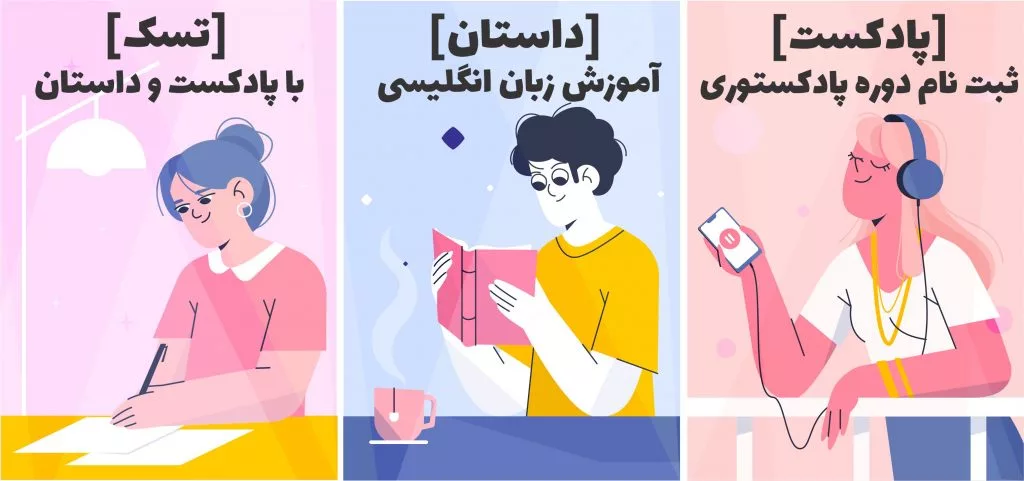پادکست انگلیسی BBC – زبان مادری
در انگلیسی هم مثل فارسی به زبان اول میگن زبان مادری: Mother tongue. و مثل خیلی از زبان های دیگه در انگلیسی کلمات و اصطلاحاتی وجود داره که جنسیت دارن اما به ایده یا مفهومی که جنسیتش مشخص باشه اشاره نمی کنن. به نظرتون به چه دلیل به زبان اول میگن زبان مادری؟ و اهمیت حفظ این زبان چیه؟ (در بخش دیدگاه نطراتتون را با ما در میون بذارید!) در پادکست انگلیسی BBC – زبان مادری می شنویم که سم Sam و جورجینا Georgina درباره ی نسبت زبان با جنسیت صحبت می کنند و در طول مسیر کلمات جدیدی هم آموزش می دن.
سوال پادکست انگلیسی BBC – زبان مادری :
Which of these languages is the newest? Is it:
a) Esperanto
b) Afrikaans
c) Light Warlpiri
به پادکست خوب گوش کن تا جواب رو پیدا کنی.
اگر می خوای گوش دادن به پادکست تا حد امکان برات ساده و کارآمد باشه مراحل زیر را دنبال کن:
هر روز به پادکست گوش کن. وقتی براش یه وقت ثابت در روز در نظر بگیری برات تبدیل به عادت میشه و این عادت هرروز پیشرفت میکنه.
پادکستی رو پیدا کن که موضوعش برات جالب باشه. وقتی از خود موضوع لذت ببری یادگیری هم برات لذتبخش میشه.
به پادکستی گوش کن که transcript یا متن داره. این بهت کمک می کنه تا کلمات و عبارات جدید رو به سرعت در متن پیدا کنی و ساختار انواع مختلف جمله رو خوب یاد بگیری.
پس از گوش دادن به پادکست با متن، در مرحله بعدی سعی کن بدون نگاه کردن به متن این کار رو انجام بدی. این کار مهارت شنیداری رو تقویت می کنه و کمک می کنه تا انگلیسی زبانان بومی را راحت تر درک کنی، حتی اگر خیلی سریع صحبت کنن.
اگه به پادکست انگلیسی گوش کردی و نتونستی کامل متوجه اش بشی، ناامید نشو. پادکست هایESL -English as Second Language بیشماری وجود دارن که برای سطوح مختلف، از ابتدایی تا پیشرفته طراحی شدن. مطمئنا هر روز می تونین یه پادکست مناسب با سطح خودت پیدا کنی.
فراموش نکن که هرچی بیشتر تمرین کنی در اون مهارت رشد میکنی! به قول انگلیسی ها: Practice makes perfect
واژگان کلیدی پادکست انگلیسی BBC - زبان مادری
| معنی به فارسی | معنی به انگلیسی | واژه |
| فردی که مسئول مراقبت از کسی است | the person most responsible for looking after someone | primary caregiver |
| مکان یا زمانی که چیزی شروع میشود و یا از آنجا میآید | the place or time where something begins or comes from | point of origin |
| استعاره | a way to describe something by saying that it is something else with similar qualities | metaphor |
| درک کردن | to understand something to be true, to think of something in a particular way | perceive |
| مهم، مورد احترام | mportant, respected | prestigious |
| تفاوت، نابرابری | a difference, an inequality | a disparity |
'?BBC 6 minute English - Why's it called 'mother tongue

متن پادکست انگلیسی BBC - زبان مادری
Note: This is not a word-for-word transcript
Sam
Hello. This is 6 Minute English, I’m Sam.
Georgina
And I’m Georgina.
Sam
Georgina, what languages do you speak?
Georgina
Well, my mother tongue is English and I also speak Spanish and French badly!
Sam
OK. It’s interesting that we say ‘mother tongue’, isn’t it? Like many languages, English has a number of gender-specific terms that don’t refer to gender-specific ideas and concepts. And this complicated relationship between language and gender is what we will be talking about today. But first, this week’s quiz question, which is also on the topic of languages. Which of these languages is the newest? Is it
A: Esperanto
B: Afrikaans
C: Light Warlpiri
What do you think, Georgina?
Georgina
Well, I’ve only heard of two of these – Esperanto and Afrikaans – so I think I’m going to choose the other one, Light Warlpiri, purely as I’ve never heard of it, so I think that must be the one.
Sam
OK, well we’ll find out if your intuition is correct later in the programme. Professor Lera Boroditsky is a cognitive scientist who was a guest on the BBC World Service programme, The Conversation. She was asked about why we use the term ‘mother tongue’ in English.
Professor Lera Boroditsky
Different languages actually do it differently, but definitely there’s a strong association between mothers as primary caregivers and people who teach us things, and so there’s that point of origin metaphor that applies in a lot of languages.
Sam
So, how does she explain the use of mother tongue, Georgina?
Georgina
Well, she says it’s a form of metaphor. A metaphor is a way of describing something by comparing it to something else. In a metaphor,though, you don’t say that something is like something else, you say that it ‘is’ something else. For example, having good friends is the key to a happy life.
Sam
It is indeed. In this metaphor, language is seen as coming from your primary caregiver, the person who looked after you most when you were young, and traditionally this was mothers.
Georgina
So, this is perhaps the point of origin, the starting place,of the metaphorical phrase, mother tongue. Let’s listen again.
Professor Lera Boroditsky
Different languages actually do it differently, but definitely there’s a strong association between mothers as primary caregivers and people who teach us things, and so there’s that point of origin metaphor that applies in a lot of languages.
Sam
Language is very powerful in society and culture, and when it comes to gendered language, it can cause some issues. Here’s Lera Boroditsky again:
Professor Lera Boroditsky
… in English of course we have some words that are gendered, like ‘actor’ and ‘actress’ or ‘waiter’ and ‘waitress’, and very commonly when there are those two gender forms people perceive the masculine form as being a more prestigious job or the more skilled job than the feminine form, so an actor is a fancier job than an actress and a waiter is a fancier job than a waitress, and so they could then come with pay disparities and so on.
Sam
So, what’s the subconscious difference in attitude towards, for example, an actor and actress?
Georgina
Well, she says that people perceive those roles differently. This means that we are aware of, or believe there is a difference in the jobs because of the vocabulary. The male form is perceived to be more prestigious – more important, more respected, even though it’s exactly the same job.
Sam
And this attitude can lead to problems such as disparities in pay. A disparity is a difference, an inequality, and in the world of work it can mean men getting paid more than women for the same job. Here’s Professor Boroditsky again.
Professor Lera Boroditsky
…in English of course we have some words that are gendered, like ‘actor’ and ‘actress’ or ‘waiter’ and ‘waitress’, and very commonly when there are those two gender forms people perceive the masculine form as being a more prestigious job or a more skilled job than the feminine form, so an actor is a fancier job than an actress and a waiter is a fancier job than a waitress, and so they could then come with pay disparities and so on.
Sam
OK, before we take another look at today’s vocabulary, let’s reveal the answer to this week’s quiz. Which of these languages is the newest, is it:
A: Esperanto
B: Afrikaans
C: Light Warlpiri
Georgina, what did you say?
Georgina
I thought it had to be Light Walpiri, but just because I had never heard of it before.
Sam
Well, congratulations. Your instincts were good, that is correct. Let’s move on to vocabulary and look at today’s words and phrase again.
Georgina
A primary caregiver is a person who has most responsibility for looking after someone.
Sam
A point of origin is the place or time when something begins.
Georgina
A metaphor is a way of describing something. We can say that something is something else that has similar qualities.
Sam
You’re a star!
Georgina
Aw, thank you.
Sam
No, I meant, you’re a star, is an example of a metaphor.
Georgina
Oh, OK. Of course, I knew that.
Sam
Mmmm, if you say so. To perceive is to think of something in a particular way. We might perceive the value of different jobs based on the vocabulary used to describe them.
Georgina
Something prestigious is important and respected.
Sam
And finally, a disparity is a difference, an inequality and is often used when talking about how men and women aren’t always paid the same for the same job. And that is all from us. We look forward to your company again soon. In the meantime, you can always find us online, on social media and on the BBC Learning English app. Bye for now.
Georgina
Bye!
امیدوارم از پادکست انگلیسی BBC - زبان مادری لذت برده باشید.
گوش دادن به پادکست روش خوبی برای تقویت مهارت شنیداری و هم چنین یادگرفتن کلمات در بستر یک موضوع خاصه که این به تقویت مهارت مکالمه انگلیسی نیز کمک زیادی می کنه.
اگه تو هم از اون آدمهایی هستی که از گوش دادن به پادکست لذت می بره برات یه خبر خوب دارم! آموزشگاه مجازی آموزش زبان انگلیسی 24talk یه دوره طراحی کرده مبتنی بر پادکست و داستان کوتاه به اسم "پادکستوری - Podcastory". این دوره سعی کرده یادگیری زبان انگلیسی رو مناسب با نیاز و سطح زبان آموز به یه فرایند بسیار مفرح، موثر، سریع و کم هزینه تبدیل کنه.
همین الان می تونی با کلیک روی عکس زیر و ثبت نام در دوره ی آموزش زبان انگلیسی با پادکست و داستان ۲۴talk اولین و مهم ترین قدم رو برای یادگیری زبان انگلیسی برداری. وقت رو از دست نده!











